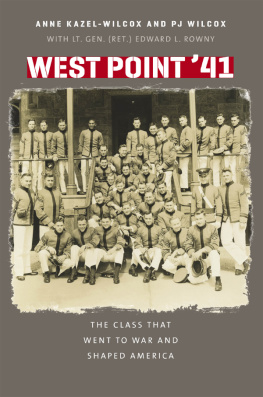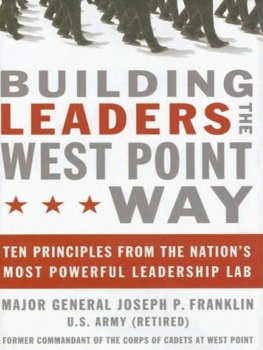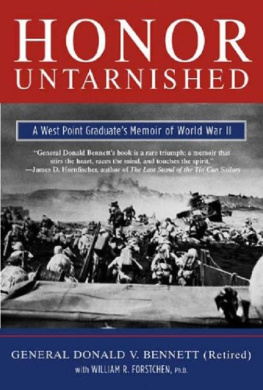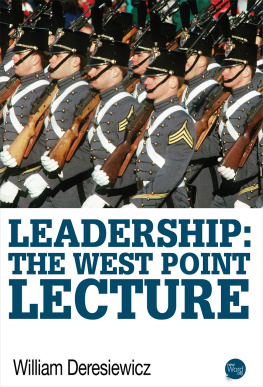L ieutenant General Dan Christman, West Points Superintendent, is a big, florid-faced man with a wide smile, an overpowering charm, and a very specific vision for the United States Military Academy. West Point, he will tell anyone who will listen, is Americas premier leadership school.
In 1998 I heard Christman use this phrase repeatedly during a three-day meeting with the presidents of West Points regional alumni organizations. In that room, at least, Christman was preaching to the choir, and the choir already believed. Graduates know the names of the West Pointers who have shaped American history: Eisenhower and MacArthur, Grant and Lee, Pershing and Schwarzkopf and Patton. They also know of the scores of leaders who serve the nation in the military and, after their service, in a wide array of civilian professions.
At the twentieth reunion of the Class of 1980, for instance, a visitor could meet: a member of Congress, four people who have worked at the White House, the military attachs to Vietnam and Jordan, a shuttle astronaut (and space walk veteran), a heart surgeon, an eye surgeon, an FBI special agent, CEOs, physicians, university professors, ministers, lawyers, entrepreneurs, engineers, scientists, airline pilots. This would also be the place to get firsthand accounts of what its like to command five hundred peacekeepers in the Balkans, or a battalion of Green Berets, or half a hundred attack helicopters on the DMZ between North and South Korea.
West Point may or may not be, in Christmans words, the school for leaders, but it is arguably among the best. If the successes of its graduates are any indicator, the Academys approach offers a template for leader development in and out of the military. There certainly is a need for leadership. Most American institutions are, in the words of Harvards John P. Kotter, overmanaged and under-led. Businesses spend millions on consultants who wheel in checklists and decision-matrices. Then the consultants go home and we find, to our constant surprise, that employees are still not inspired.
For two hundred years West Point has taken talented young Americans and put them through an intense four-year program to build leaders of character. On graduation day the Superintendent sends them out with a rolled-up diploma and an astonishing set of experiences. How do those experiences help mold leaders? Id spent four years as a cadet and another four on the faculty (out of eleven years service), and still wasnt sure I could put my finger on exactly how it happened. So in 1998 I started looking for an answer, and I began my search in the office of a leadership professor at USMA.
If you ask five people around here how leaders are made, youre going to get five different answers.
Lieutenant Colonel Scott Snook delivers this not-quite-what-I-was-looking-for answer in his windowless office deep inside Thayer Hall, the Academys largest academic building. Unlike the stereotypical professors office, this one is neat: The books are arranged by subject, there are no piles of student papers or coffee-stained journals. One large bulletin board shows a military map of Grenada and a photograph of some GIsarmed, their faces dark with camouflageholding a Cuban flag. The soldier kneeling at the lower right is then-Lieutenant Snook. In the corner of another bulletin board is a movie still of John Wayne from the 1962 D-Day epic, The Longest Day. Snooks Harvard degreesan M.B.A. and a Ph.D.hang on another wall.
I met Scott Snook when he was a much-less-accomplished yearling, or second-year cadet, and we were assigned to dig a foxhole together.
Snook rolls his chair to a filing cabinet and pulls a folder, then slides the packet across the desk insistently. The document inside, dark with close-spaced type, is the result of an in-depth study of leader development at West Point. The language, dense and pedantic, goes on for several mind-numbing pages. Then, a sentence in bold type: USMA has no clearly articulated learning model or theory for how to develop leaders of character.
I thought this a pretty serious omission for an institution charged with doing exactly thatat great expense to the taxpayer.
We do what we do now because it has worked in the past, Snook says. But there is no master plan, no theory to help determine what does and does not contribute. This explains why old grads (anyone from the most recently graduated back to eighty-year-old alumni) can talk about the same rite of passage, and one will claim, It made me the man I am today; while the other will say, It was mostly stupid, fraternity-row stuff and a waste of my time.
Think of it like an academic course, Snook says. The Cadet Leader Development System is the syllabus. It describes what you do throughout the forty lessons of the semester. Then you have the tests and exams and papers to evaluate the students understanding. We have all that in place, too. What we dont have is what comes before the syllabus, a theory of how students learn the subject.
This finding was not well received by the Commandant, the one-star general responsible for cadets military training. Was it possible, the Commandant wanted to know, that this self-described premier leadership institution had merely stumbled onto something that had worked well for so long? How, exactly, does West Point develop leaders of character?
Snooks group wrote, Our typical response is descriptive at best: We have three programs: the military, the academic, and the physical. Within each program, cadets participate in a series of progressive and sequential activities. Here is a list of those activities
The study doesnt claim that what West Point is doing is flawed, but without a clearly articulated theory of how leaders are developed, there is no yardstick for evaluating new programs, no measure by which to judge current practices. The lack of an underlying theory means that questions about how to do thingsand what the right things areare difficult to address.
The report goes on to say that, If we believe that the West Point experience is fundamentally sound, then we should be able to start with what we already do and back in, get the theory from practice. Following this reasoning, the report offers a model for leader development:
The basic ingredient is good people. West Point takes great pains to admit young men and women who have demonstrated a readiness to learn, a willingness to take on responsibility. Thats why the admissions committee looks for the above-average student who is also the team captain, a leader in her church, a volunteer firefighter.
Then there are four key elements of the developmental experience. The firstand West Point excels at thisis challenge: dragging cadets out of their comfort zone, giving them novel experiences and difficult goals, forcing them to resolve conflicts and take on new roles. There must also be a variety of challenges, from the physical to the purely intellectual. The goal is to make sure that no cadet can function solely in the arena he or she feels most comfortable in. Quiet cadets are made to speak up, the football players do gymnastics, the women take hand-to-hand combat.
To get the most out of these challenges, the cadets must have support, which is the second part of the model. Every member of the staff and faculty is a coach; professors and instructors are Army officers first. The third part of the model is assessment. USMA has a variety of feedback tools, some of them obvious: Cadets are graded for performance in leadership roles. Some of the assessment tools are not so obvious: A lot of self-examination goes on in the conversations among teammates, classmates, roommates. The fourth part of the model calls for reflection, for time to let the lessons sink in. Maturity doesnt come overnight.









